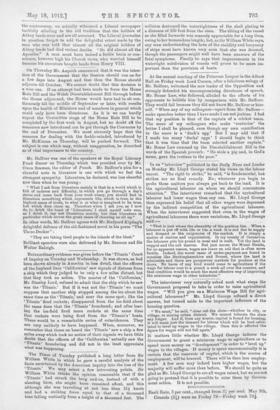The interviewer very naturally asked next what steps the Government
proposed to take in order to raise agricultural wages. "Will you give us a Minimum Wage Bill for agri- cultural labourers?" Mr. Lloyd George refused a direct answer, but turned aside to the important influence of the housing question.
" We must," he said, "clear out the slum—whether in city, or village, or mining urban district. We cannot tolerate the slum any longer. And if, from any source, capital is found for housing, it will mean just the demand for labour which will be best calcu- lated to level up wages in the village. Once this is effected the figure for wages will not fall again."
It matters little whether Mr. Lloyd George induces the Government to grant a minimum wage to agriculture or to spend more money on " development " in order to "level up" wages in the villages. If money is spent uneconomically it is certain that the reservoir of capital, which is the source of employment, will be lowered. There will be then less employ- ment. A few men may indeed have higher wages, but the majority will suffer more than before. We should be quite as glad as Mr. Lloyd George to see all wages raised, but we are not going to pretend that it is possible to raise them by Govern- ment action. It is not possible.










































 Previous page
Previous page